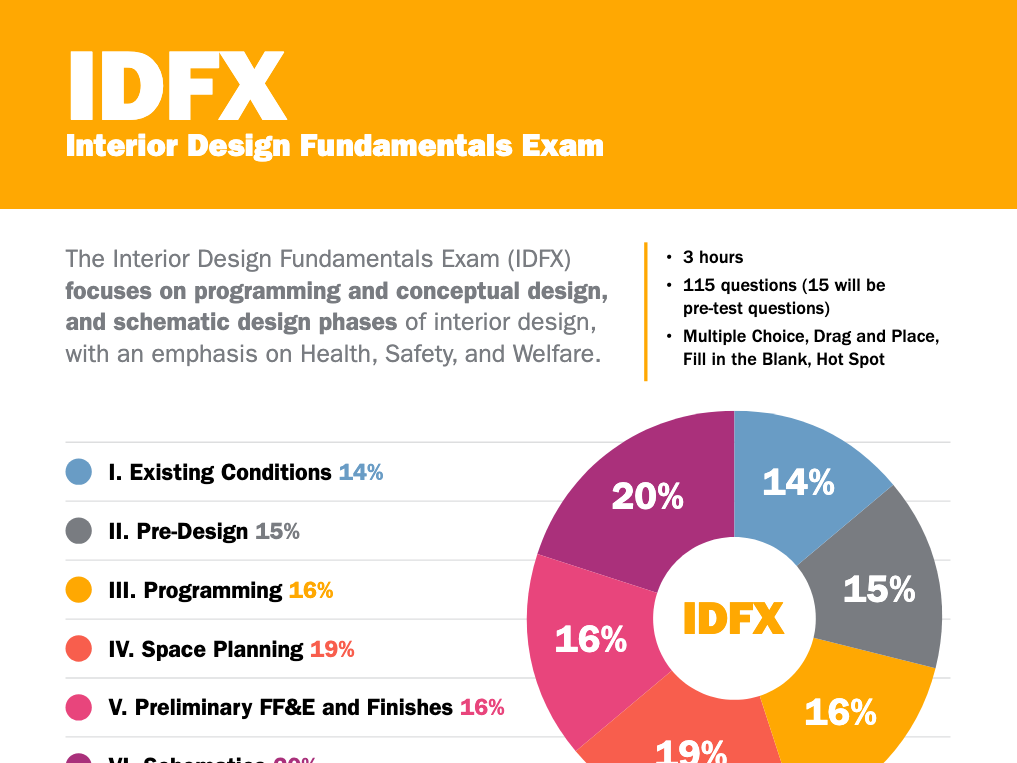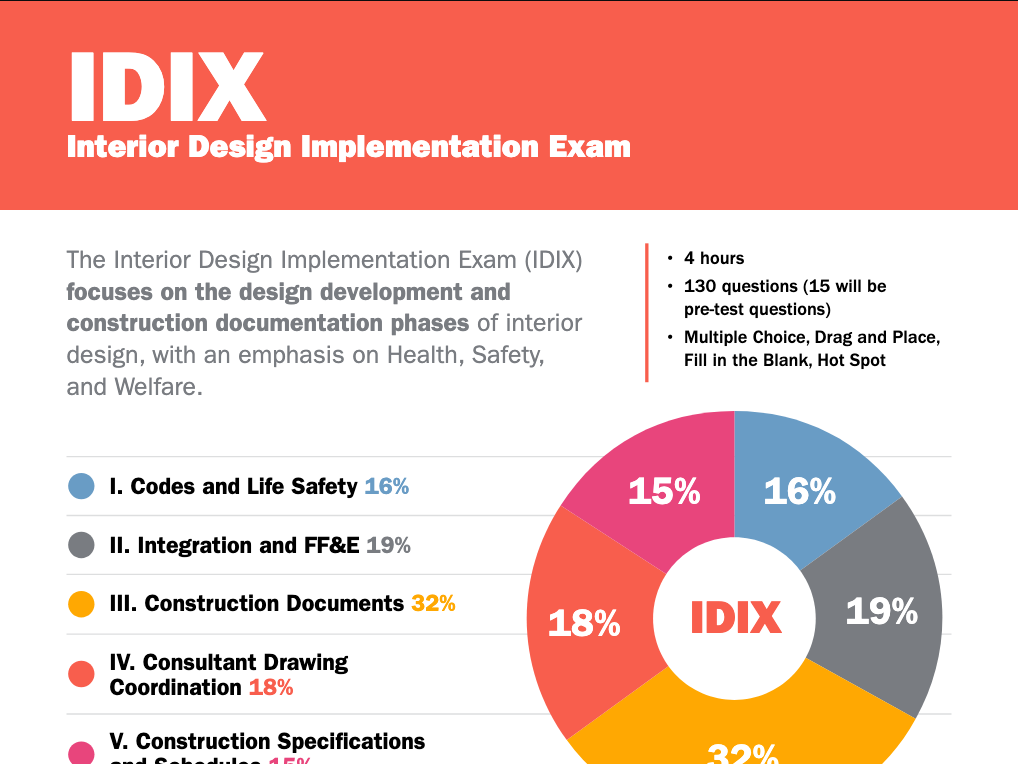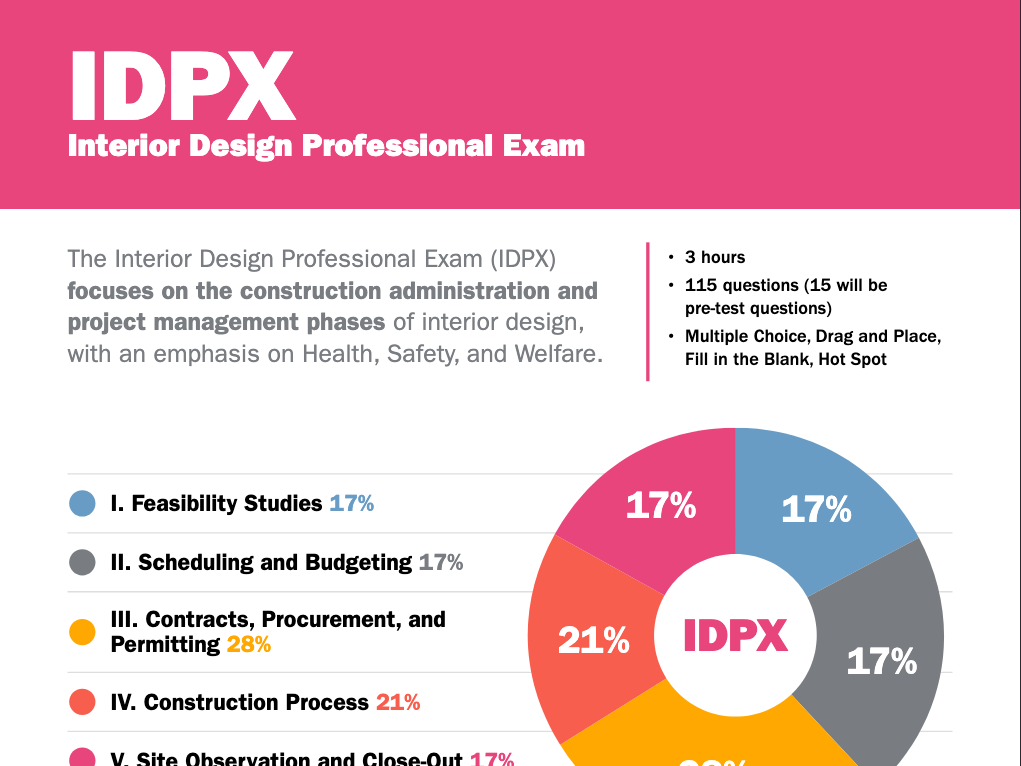About the Exams
Learn who should take the exam, plus info on schedules, fees, scoring, and exam day rules.
NCIDQ Exam Dates & Deadlines
Ready to take the next step? Use the chart below to plan ahead and meet your deadlines. Submit your complete and paid application on time to stay eligible for review.*

Application Fees
If applying under Route 1 (IDFX, IDPX, IDIX)

You will apply for all three exam sections together.
If applying under Route 2 (in two parts)

Apply for Part 1: IDFX Only if you do not yet meet the work experience requirement.
Submit a second application for Part 2: IDPX & IDIX once your work experience is complete.
All fees are listed in U.S. dollars. Payment must be made electronically — checks are not accepted.
-

IDFX: Fundamentals Exam
Available to interior design students in their final year of a Bachelor’s or Master’s program or recent graduates who haven’t completed the work experience requirement.Learn more about IDFX
IDIX: Implementation Exam
Available to candidates who have completed both education and required work experience.Learn more about IDIX
IDPX: Professional Exam
Available to candidates who have completed both education and the required work experience.Learn more about IDPX8 Important Exam Day Rules
- Identification Required
- Names Must Match
- Verify Appointment Information
- Arrive 30 Minutes Prior To Start Time
- Bio Break Policy
- Testing Concerns
- Reschedule Policy
- Cancellation Policy
How the NCIDQ Exam Is Developed
A rigorous, research-based process to ensure fairness, validity, and reliability.
CIDQ develops the NCIDQ Exam in accordance with national testing standards, working with licensed psychometricians and interior design professionals to ensure every step supports public health, safety, and welfare.
1. Research & Exam Design
Defining what to test—and how
a. Practice Analysis
CIDQ routinely conducts a job task analysis with subject matter experts to define the overall practice areas and distinct tasks, knowledge, and skills required to validate competency.b. Exam Blueprint
Practice Analysis data is used to develop an exam blueprint, which outlines exam content (weight and number of corresponding questions in each practice area or task).c. Item Development
NCIDQ Certificate-holding subject matter experts, who are trained in question writing, create and review valid and reliable test questions. Every item must be:- Based on essential industry knowledge for the protection of public health, safety, and welfare
- Clearly written and defensible
- Able to distinguish between competent and non-competent performance
2. Item Validation & Assembly
Bringing the exam to life—and ensuring it performs
a. Pretesting Questions
All new questions are tested without being scored to evaluate clarity, difficulty, and performance before inclusion in the live exam.b. Exam Assembly
Exam forms are built selecting appropriate questions aligned to the exam blueprint percentages. Designers and psychometricians review each version to ensure maximum quality and an appropriate mix of content.c. Final Review & Revisions
Exams are reviewed again for technical accuracy and to ensure integrity by both testing experts and NCIDQ Certified designers.3. Scoring, Testing & Quality Assurance
Maintaining consistent standards for every candidate
a. Passing Score Setting
CIDQ sets a minimum passing point based on the knowledge and skills needed to practice independently and safely.b. Secure Test Administration
Exams are delivered under strict guidelines that ensure security, accessibility, and a fair testing environment for all candidates.c. Psychometric Analysis
After each exam cycle, CIDQ performs statistical analysis to validate the quality, consistency, and reliability of the test and every question.NCIDQ Exam Pass Rates
Pass rates for all three exam sections are listed below for your reference.
IDFX IDPX PRAC Fall 2025 55% 65% 67% Spring 2025 53% 61% 63% Fall 2024 53% 56% 69% Spring 2024 49% 63% 65% Fall 2023 51% 58% 69% Spring 2023 55% 62% 62% Fall 2022 48% 58% 65% Spring 2022 53% 59% 54%
Scoring the NCIDQ Exams
All CIDQ scoring procedures are designed to ensure every exam is fair, valid, and reliable.
Download the infographic:

Exam Scoring Overview
All three sections of the NCIDQ Exam—IDFX, IDPX, and IDIX—are scored by computer. Each exam is measured on a scale from 200 (0 correct) to 800 (all correct), with 500 set as the passing score.
To ensure fairness across different exam versions, CIDQ uses statistical equating, a standard method that adjusts for variations in test difficulty while keeping the scoring consistent.
How Passing Scores Are Determined

CIDQ uses the Angoff Method to determine passing scores for each exam section.
This process involves a panel of NCIDQ Certificate Holders (subject matter experts) who review every test question and predict how many minimally qualified candidates would answer each one correctly.
Standard Setting Process Includes:
- SMEs from varying backgrounds are selected and trained.
- Each SME independently reviews and rates the exam questions.
- Ratings are analyzed for consistency and refined in a second round of review.
- Final averages determine a recommended passing score, which is then reviewed and approved by the CIDQ Board of Directors.
This ensures the scoring standard is determined empirically, legally defensible, and in full compliance with the Standards for Educational and Psychological Testing.
Score Reports & Notifications

Official Score Reports
- Available approximately 6-8 weeks after the exam window closes: April 30 or October 31
- Reports include:
- a. Final score
- b. Exam date
- c. Performance breakdown by content area
If you did not pass an exam section, use your score report to identify and focus on the areas where you were weakest in preparation for a future attempt.

New Exam Blueprints | 2026 & Beyond
Updated exam structure to better reflect today’s design practice.
Starting in 2026, CIDQ will implement new blueprints for all three sections of the NCIDQ Exam based on insights from the latest Practice Analysis study.



What’s Changing?
- Streamlined Content: Revised blueprints reduce overlap across exams and align topics more clearly. Each exam covers two design phases.
- Smarter Studying: The new structure helps candidates focus their preparation more efficiently by clarifying topic areas for each exam.
- PRAC Becomes IDIX: The current PRAC (Practicum) exam will be replaced by a more intuitive IDIX (Implementation) exam.
Why It Matters
These updates enhance the candidate experience and ensure the NCIDQ Exam continues to reflect the evolving standards of interior design practice—supporting public health, safety, and welfare.
Review the new exam blueprints: